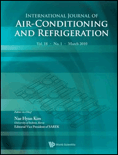
International Journal of Air-Conditioning and Refrigeration
Scope & Guideline
Exploring the Frontiers of Air-Conditioning and Refrigeration
Introduction
Aims and Scopes
- Thermal Management Technologies:
The journal explores various thermal management solutions, including heat pumps, refrigeration cycles, and heat exchangers, focusing on efficiency improvements and innovative designs. - Sustainable Refrigeration Systems:
Research on eco-friendly refrigerants and technologies aimed at reducing environmental impact and enhancing sustainability in refrigeration systems is a core area of focus. - Computational and Experimental Methods:
The journal publishes studies utilizing both computational fluid dynamics (CFD) and experimental investigations to analyze thermal performance, heat transfer characteristics, and system efficiencies. - Energy Analysis and Optimization:
A significant portion of the research is dedicated to energy, exergy, and economic assessments, promoting the optimization of refrigeration and air-conditioning systems for improved energy use. - Indoor Air Quality and Thermal Comfort:
The journal addresses the impact of air conditioning and refrigeration systems on indoor air quality and thermal comfort, providing insights into health and safety in built environments.
Trending and Emerging
- Advanced Refrigeration Technologies:
There is a growing emphasis on innovative refrigeration solutions, including magnetic refrigeration and thermoacoustic systems, which represent a shift towards alternative technologies with lower environmental impact. - Machine Learning and AI Applications:
The use of machine learning algorithms to model and optimize refrigeration and air-conditioning systems is on the rise, indicating a trend towards integrating artificial intelligence for enhanced performance and predictive maintenance. - Energy Efficiency in Building Systems:
Research focusing on the integration of HVAC systems with energy recovery ventilators and direct evaporative cooling methods has increased, highlighting the importance of energy-efficient designs in modern buildings. - Impact of Indoor Environment on Health:
The correlation between indoor air quality and occupant health is gaining attention, particularly studies that investigate the transmission of airborne pathogens and the role of ventilation systems in mitigating risks. - Nanofluids and Advanced Materials:
The exploration of nanofluids for enhanced heat transfer in refrigeration systems is emerging, showcasing a shift towards materials science in developing more efficient thermal management solutions.
Declining or Waning
- Traditional Refrigeration Techniques:
Research focused on conventional vapor-compression refrigeration systems without innovative modifications or alternative approaches has decreased, as the field shifts toward more sustainable and advanced technologies. - Non-Energy Related Environmental Impacts:
Studies examining environmental impacts unrelated to energy efficiency, such as minor ecological effects of refrigerants, have waned, possibly due to a broader focus on significant sustainability metrics. - Basic Theoretical Models:
Papers that solely present theoretical models without practical applications or experimental validation have become less common, as the journal increasingly favors applied research and real-world implications.
Similar Journals

Computational Thermal Sciences
Transforming Thermal Processes through Computational ExcellenceComputational Thermal Sciences, an esteemed journal published by BEGELL HOUSE INC, presents cutting-edge research at the intersection of computational mathematics, energy engineering, and fluid dynamics. With an ISSN of 1940-2503 and an E-ISSN of 1940-2554, this journal aims to disseminate high-quality research articles, reviews, and methodologies that improve our understanding of thermal processes and their applications. Renowned for its solid impact in the field, it holds a Q3 ranking in multiple categories including Computational Mathematics and Energy Engineering for 2023. As the field evolves, the journal continues to play a pivotal role in bridging theoretical research with practical innovations, thereby catering to a diverse audience of researchers, professionals, and students. Although it operates on a subscription model, the journal ensures accessibility to significant contributions in thermal sciences from 2009 to 2024, fostering an environment of knowledge sharing and collaboration.
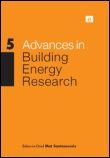
Advances in Building Energy Research
Unlocking Insights in Energy Conservation for ArchitectureAdvances in Building Energy Research is a pivotal journal dedicated to the scholarly exploration of energy efficiency and sustainable practices within the building and construction sector. Published by Taylor & Francis Ltd from the United Kingdom, this journal provides a rich platform for researchers, industry professionals, and students interested in the latest advancements and methodologies that drive energy conservation in architecture and engineering. With an impressive 2023 Scopus ranking of #64 out of 223 in the Building and Construction category and a notable Q2 category quartile, the journal occupies a significant position in its field, emphasizing high-quality, peer-reviewed research that meets the needs of a global audience. Though it operates under a subscription model, its contributions are invaluable for advancing knowledge that addresses the urgent challenges of energy consumption and sustainability in built environments. Spanning research published from 2007 to 2024, this journal continues to be an essential resource for those seeking innovative solutions and insights into building energy performance.
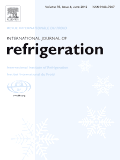
INTERNATIONAL JOURNAL OF REFRIGERATION
Exploring breakthroughs in refrigeration technology.International Journal of Refrigeration, published by Elsevier Science Ltd, is a leading periodical dedicated to advancing the field of refrigeration and its applications. With an impressive impact factor and ranking in the top quartile (Q1) of both Building and Construction and Mechanical Engineering categories, this journal has been instrumental in disseminating innovative research and breakthroughs since its inception in 1978. Covering a vast array of topics related to refrigeration technology, thermodynamics, and energy efficiency, it serves as an essential resource for researchers, engineers, and students alike. By providing high-quality, peer-reviewed articles, it aims to foster interdisciplinary dialogue and contribute significantly to the development of sustainable practices in the refrigeration sector. Although the journal does not offer open access options at present, its rigorous publication standards ensure that the latest advancements reach a broad audience in the academic and professional communities.

International Journal of Heat and Technology
Pioneering Research in Thermal Science and TechnologyThe International Journal of Heat and Technology is a premier academic publication dedicated to the dissemination of innovative research in the fields of thermal engineering, fluid mechanics, and condensed matter physics. Published by the INT INFORMATION & ENGINEERING TECHNOLOGY ASSOCIATION and based in Italy, this journal has been a significant resource for researchers and professionals since its inception in 1983, with a commitment to advancing knowledge until 2024. With an impact factor that reflects its relevance, the journal encompasses diverse topics within its scope, bridging gaps between theoretical research and practical applications. Although currently not open access, the journal provides valuable insights into the nuances of heat transfer, flow dynamics, and material properties, making it a critical reference for academia and industry alike. The journal's Scopus rankings position it within the competitive landscape of chemical and mechanical engineering, highlighting its contribution to advancing these fields. We invite scholars, professionals, and students to engage with the rich content provided within its pages, to foster a deeper understanding of heat and technology in our rapidly evolving world.
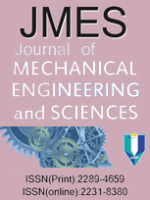
Journal of Mechanical Engineering and Sciences
Elevating Research in Mechanical Engineering and BeyondThe Journal of Mechanical Engineering and Sciences (ISSN: 2289-4659, E-ISSN: 2231-8380), published by UNIV MALAYSIA PAHANG, is a prominent open access journal established in 2011, dedicated to advancing the field of mechanical engineering and associated sciences. Covering a wide array of topics from industrial manufacturing processes to computational mechanics, the journal serves as a vital platform for researchers, professionals, and students to disseminate innovative findings and methodologies. With impressive Scopus rankings, including a place in the 60th percentile for Industrial and Manufacturing Engineering, the journal holds a significant position among its peers, facilitating global academic discourse. Located in Kuantan, Pahang, Malaysia, the journal emphasizes accessibility and collaboration within the engineering community, encouraging submissions that contribute to both theoretical and applied aspects of mechanical engineering.
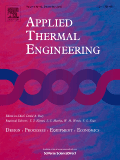
APPLIED THERMAL ENGINEERING
Transforming energy challenges into engineering solutions.Applied Thermal Engineering is a leading international journal dedicated to the field of thermal engineering, published by Pergamon-Elsevier Science Ltd. With an impressive impact factor indicating its significance in the academic community, this journal focuses on innovative research and developments related to energy engineering, fluid flow, and transfer processes, as well as manufacturing and mechanical engineering. Being indexed in top quartiles (Q1) across multiple categories, it ranks exceptionally well on platforms like Scopus, ensuring that contributors reach a wide and relevant audience. The journal supports both open access and subscription options, promoting the dissemination of vital research findings from 1996 to 2024. With its commitment to advancing the discipline and implementing rigorous peer-review processes, Applied Thermal Engineering serves as an essential resource for researchers, industry professionals, and students aiming to stay abreast of the latest advancements and applied methodologies in thermal science.

Archives of Thermodynamics
Elevating Understanding of Energy TransformationsArchives of Thermodynamics is a reputable journal dedicated to the field of thermodynamics, published by the esteemed POLISH ACADEMY OF SCIENCES. With a robust history since its inception in 2003, this journal serves as a critical platform for disseminating high-quality research aimed at advancing knowledge and technology in thermodynamic systems and processes. Recognized for its contribution to the field, it holds a Q3 ranking in the Physics and Astronomy (miscellaneous) category as of 2023, with a respectable Scopus rank of #148 out of 243, placing it within the 39th percentile. Although it follows a traditional access model, the journal's commitment to scholarly excellence ensures that researchers, professionals, and students alike can benefit from its rich archives and ongoing discussions within the scientific community. Situated in Warsaw, Poland, the journal not only reflects a regional dedication to scientific progress, but also engages with global audiences interested in the evolving landscape of thermodynamic research.

Journal of Engineering Thermophysics
Exploring the synergy of heat and engineering excellence.Journal of Engineering Thermophysics, published by PLEIADES PUBLISHING INC, is a premier academic journal dedicated to advancing the field of thermophysics and its applications across a variety of engineering disciplines. With an ISSN of 1810-2328 and an E-ISSN of 1990-5432, this journal offers an essential platform for researchers and professionals to disseminate cutting-edge findings on the interplay between thermal processes and engineering systems. As of 2023, it is recognized within the Q3 category in key fields such as Condensed Matter Physics, Energy Engineering and Power Technology, Environmental Engineering, and Modeling and Simulation. Moreover, the journal contributes to an important dialogue in the environmental sciences, ranking 111 out of 197 in Environmental Engineering, and positions itself prominently within the academic landscape from its establishment in 2007. Although currently not an open-access journal, it facilitates a selective yet impactful communication of research that drives innovation and knowledge in the thermal sciences. For those engaged in understanding the thermal dynamics essential for sustainable engineering solutions, the Journal of Engineering Thermophysics is the go-to resource for published research, reviews, and advancements in the field.
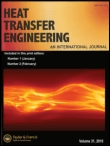
HEAT TRANSFER ENGINEERING
Pioneering research in thermal dynamics and engineering solutions.HEAT TRANSFER ENGINEERING is a leading international journal published by Taylor & Francis Inc, dedicated to advancing the field of heat transfer and thermal engineering. With a strong focus on the key aspects of Condensed Matter Physics, Fluid Flow and Transfer Processes, and Mechanical Engineering, this journal covers a comprehensive range of topics from experimental studies to theoretical analysis, aiming to foster innovative research and practical applications. Since its inception in 1979 and continuing through 2024, the journal has established itself as an essential resource for researchers and industry professionals alike, reflected in its solid rankings within Scopus—holding a Q2 quartile classification in multiple engineering disciplines. Although not open access, the journal ensures broad accessibility through institutional subscriptions, making cutting-edge research readily available. With its rigorous peer-review process and commitment to quality, HEAT TRANSFER ENGINEERING plays a crucial role in shaping the future of thermal management solutions and engineering practices.
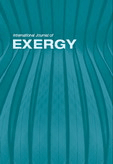
International Journal of Exergy
Pioneering Research in Exergy and SustainabilityThe International Journal of Exergy, published by InderScience Enterprises Ltd, stands as a vital resource in the field of energy research, particularly focusing on the innovative utilization and sustainable management of energy resources. With an ISSN of 1742-8297 and an E-ISSN of 1742-8300, this journal serves as a platform for disseminating groundbreaking research from 2004 to 2024. It has been recognized for its scholarly contributions, earning a category ranking of Q3 in Energy (Miscellaneous) for 2023 and holding a Scopus rank of #44 out of 73 in the General Energy category, positioning it in the 40th percentile of its peers. Although under a traditional subscription model, the journal attracts a diverse readership committed to exploring the intricacies of exergy and efficiency in energy systems. Engaging with cutting-edge studies, original research, and reviews, International Journal of Exergy is indispensable for researchers, professionals, and students alike who seek to advance their understanding and applications in energy technology and sustainability.